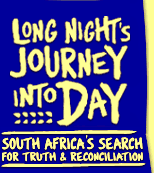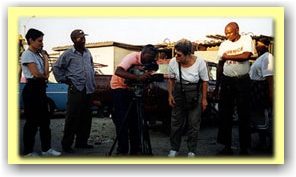
In November 1999, before the release of Long Night’s Journey into Day, journalist and filmmaker Donna Carter caught up with Frances Reid and Deborah Hoffmann for an informal chat about the film.
Tell us a little about who you are and what you do.
Frances: I’m a documentary filmmaker. I’ve been making documentary films for almost 30 years and also doing documentary cinematography, especially during the 80s. The past 9 years now I’ve been mostly producing and directing documentaries about social change, social issue-type documentaries.
Deborah: I’ve actually mostly worked as a documentary editor the past 20 years. I directed my first film [Complaints of a Dutiful Daughter] six years ago, a personal film about my mother. So this is the first film of this sort that I’ve also been one of the director’s on.
Top of Page
Why do most of your films have to do with social change and social issues?
Frances: I think it goes back to when I first started making films. As someone who had been involved in the antiwar movement, the civil rights movement, the women’s movement, the gay rights movement, it made sense to me that I brought all of my politics to my filmmaking, and, for me, filmmaking seemed like a really wonderful tool for communicating what I wanted to communicate to the world.
I think sometimes we can overrate the power of film, but I have seen films I have made have an effect on people’s lives, people’s attitudes, their perceptions of things, so that is very exciting.
Why did you choose this topic – the Truth and Reconciliation Commission?
Deborah: We first heard about the TRC one rainy day driving in the car. It was on NPR, one of those situations where you can’t get out of the car because you have to keep listening to the radio. We were hearing about the hearing happening in South Africa, just horrible gory details. These gory stories were being told, and the country of South Africa was talking about reconciliation.
It just blew my mind the idea that first of all a whole country would agree to uncover its past, as opposed to cover up its past, and then would agree to discuss, on a national level; How would we heal and move on?
I think for me in particular, because I’m a person who does hold a grudge and does not forgive people, I found it a very challenging idea.
So first we heard the thing on NPR and then it was months later we were eating breakfast and were reading in the NY Times another story about the TRC. I really had the feeling “God! In my lifetime this is the most exciting international thing that I’ve been alive for.” And I foolishly said to Frances, “I hope somebody’s making a film about this.”
There was this horrible silence. I looked up and I saw her face. Oh God! Obviously, she was thinking, “Why not us?”
Frances: I should interject that the first films I ever made were in Africa in the early ’70’s. Then, I did another film in Africa in the early ’90s on AIDS. I had never been back to South Africa after ’91, after the ANC was unbanned. So, it was a combination of us believing this was a monumentally important thing that was happening, and it was also my way of bringing a lot of things of interest of mine together.
Top of Page
When you look at this idea of truth and reconciliation, what do you see as the most important impetus for telling this story? What is the historic import of this story?
Frances: There have been a lot of truth commissions around the world in relation to human rights abuses. I think this is the first time there has been a real commitment to the truth.
A lot of the other ones have been sort of doing blanket amnesty, for instance, where there really is no individual accountability. What excited me about what they were doing in South Africa was that there was individual accountability. But that didn’t mean individuals were going to be prosecuted or there was going to be retribution against individuals, but that individuals had to account for what they had done and come forward and say, “Yes. I did this thing,” and give the details of what they did. And those details, otherwise, would have been buried forever.
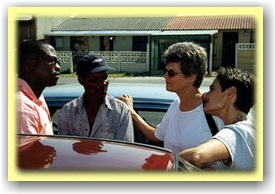 You look at the Nuremberg Trials where you have Nazi after Nazi coming up and not accepting any blame for what they did. Suddenly, in South Africa, you have people coming forward and saying, “I did do these things.”
You look at the Nuremberg Trials where you have Nazi after Nazi coming up and not accepting any blame for what they did. Suddenly, in South Africa, you have people coming forward and saying, “I did do these things.”
I think that has been a really important first step to healing. I think that is something that can be so applicable to so many situations around the world, not only on an international scale but even on an interpersonal scale. In terms of, like this country, looking at slavery and looking at the way that native Americans were decimated to sort of use something like they have done in South Africa as a model, I think would be really healthy and healing for this country.
Did making this film, sitting through the hearings over in South Africa, listening to the stories, did it take a personal toll?
Deborah: I think it did. Initially we sort of thought, here we are these Americans coming from the outside. We sort of questioned ourselves. Do we have the right to do this? Is this really okay? And then, I think we realized we’re probably better-equipped to do this than anybody.
All the people there who were covering this were, literally, having nervous breakdowns. It was so intense, so unrelentingly awful; and it went on and on and on. We got to go there seven or eight times. Then, we got to come home and refuel and clear our heads before we went back.
I think it took a huge emotional toll, it would on anybody, to be hearing these stories of what people can do to each other. But I think we have the luxury of being able to come home and put a distance between ourselves and it, and not have to walk down the street and think, “Oh, right. The killer of my father is still out there.” We didn’t have to face what it means personally for people to get amnesty.
Frances: I think it really helped that there were two of us so we could decompress and debrief at the end of the day. The one time I went myself it was in the midst of a very intense hearing. The stories were of such intense betrayal on the part of the police of these young kids. By the middle of the week I was starting to have my nervous breakdown too. It really was hard to hear that day-after-day.
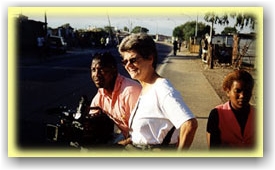
A person can make social issues films, but how much is that really a catalyst to inspire others to actually do anything?
Frances: Maybe I can answer by way of a story. We took the film to the independent feature market in New York in September. We were very nervous. It was the first time we were showing it publicly, and it was just a rough cut.
This was a screening where you have festival programmers and distributors and broadcasters and people who tend to come in and be pretty hard- boiled when they’re sitting and watching something and leaving after 10 minutes. You just kind of get used to that.
Well, after the screening, there were all of these industry types standing around in the lobby talking about the meaning of forgiveness and would they be able to themselves personally do what people were doing in South Africa, and how would they feel if their child had been killed.
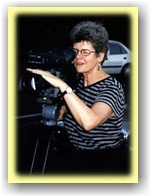 It blew our minds, that this was the conversation that these folks were having. They weren’t talking about, “Well, I don’t know if we can distribute this film or not.” It was completely about the content of the film. I mean, if we could reach that crowd, I felt like we were in pretty good shape.
It blew our minds, that this was the conversation that these folks were having. They weren’t talking about, “Well, I don’t know if we can distribute this film or not.” It was completely about the content of the film. I mean, if we could reach that crowd, I felt like we were in pretty good shape.
For me that is the hope for the film, that it will inspire that kind of dialogue. We just showed it the other night to our board of directors and one of our members, who is African American, talked about the scene at the end of the film with the black policeman and the mothers. She said that scene would be so good for black policemen in this country to see because of the kind of conflict they sometimes feel about policing in their own communities. She was all ready to take it out and find ways to use it specifically in that context.
I think within each one of those stories there is a lot of grist for people’s mills. That is what we hope for. I would love to even get it beyond the talking about it. I’m not sort of audacious enough to think this film will make the difference, but I would love to feel like the process of the TRC and people learning about the process of the TRC might get people in this country thinking, “We could really use something like that here.”
Coretta Scott King talked about wanting to do that in relationship to (Martin Luther) King’s assassination. She said it’s not so much about finding and prosecuting anybody else who might have been involved in his death, but we just want to know. That truth would be really helpful and healing for this country. I would just love to see some of that over here.
Deborah: A number of the commissioners have been asked to go to Northern Ireland and Bosnia, the Middle East and have actually been going around consulting with other places about how to possibly set up something like this. We’re not public people like that, but hopefully the film could be an ambassador to other parts of the world that are trying to figure out how to heal and move on.
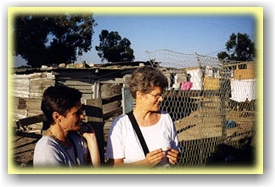
How were you received as two, Caucasian, female Americans?
Deborah: We were welcomed with open arms. The only place where we weren’t completely welcome was with some of the Afrikaners . . . They were suspicious. But in terms of any activists of any color, any government (types) or commissioners or any people involved in the truth commission, it was astonishing the access we had and the way we were treated.
Frances: Also the victims the mothers and widows and sufferers, they were incredibly open with us and wonderful. We went there not necessary expecting that. I went there very much with the trepidation of two white American girls, who do we think we are?
We’ve made very many close friends there, but the first friend we made was this white South African filmmaker, and she challenged us on that right away. She said, “If you are going to come here and make a film on this subject, you owe it to this country to bring this film back here. So many journalists just come here and do their thing here, and then they leave with it. It would be very valuable to the people of this country to see your perspective as outsiders on this process.”
And so, from the very beginning, because of her challenge, we made that commitment that we would bring the film back to South Africa.
This last trip I was just on, I showed the film to this filmmaker and one of the commissioners who has been very supportive of us from the beginning. Glenda (Wildschut), who was the commissioner, said to me, “I didn’t think it was possible for somebody who is not a South African to make the film that you’ve made.”
What was it like collaborating on this project?
Deborah: (laughter) What is this, air the dirty laundry time?
Frances: (laughter) It’s the best and the worst. It’s been a wonderful collaboration. I feel like we complement each other really well in terms of our sensibilities and work styles. Of Course, sometimes it’s very hard. It is hard to be life partners and also be making a film together because you inevitably at some point hate the person that you’re working with and if that person is also whom you are living with . . . .
Deborah: You have no one to complain to. You can’t say, “You won’t believe what the jerk there at the office did to me.”
Frances: That’s the downside. There are a lot of documentary filmmaking couples in the Bay area, and I don’t think we’re necessarily one of them. We took this on as a particular film we wanted to make together. That doesn’t mean we want to go on making films together for the rest of our lives. I mean, who knows. But right now . . . .
Deborah: We don’t want to ever make another film as long as we live anyhow.
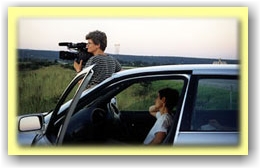
Which of the hearings affected you most? Which is the story you just can’t shake?
Deborah: What affected me most was not the stories I heard (I mean every one of them was something you couldn’t’ shake), but it was the understanding – and maybe this is the most obvious thing in the world, but it took me halfway through my life to get it – that the course of the world and history really is made by just ordinary people like myself. I never really understood that before.
Meeting just these wonderful, and terrible people, and meeting these commissioners and meeting these perpetrators and realizing they were just, at each extreme, they really were just regular people. At a certain point they either made the decision to be incredibly weak and stupid, or they made the decision to be incredibly committed, and they made a difference.
I just came away being incredibly inspired and I realized that we all have a lot more power in the course of the world than I understood before.
Top of Page
Anything you would like to add?
Frances: The only thing I would add to that is I think what made the TRC work, and there are a lot of flaws to the TRC, but the thing that immediately astonished us when we went there was the level of transparency they were committed to.
The very first time we walked in that office and we said we want to talk to so-and-so and so-and-so, they said, “Oh fine. When?” It felt so different than if you went to Washington DC and you wanted to talk to an official about something, and what you would have to cut through, and then, when you talked to that official, the sort of bullshit you would hear, the party line you would hear. There was no party line that we heard, which is not to say the TRC didn’t have one, but when it came time to asking a question, we got an honest response.
There was this culture within the TRC of openness and transparency because they knew that was the only way the process was going to work, and that’s what they wanted to model for the whole country.




